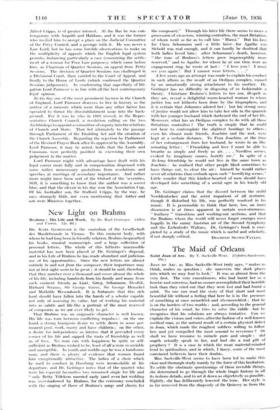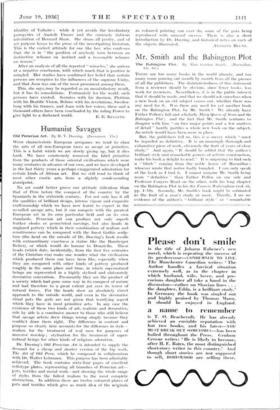The Maid of Orleans
JOAN OF Aite, as Miss Sackville-West truly says, " makes us think, makes us question ; she uncovers the dark places into which we may fear to look." It was so almost from the very first. The very executioners, who had burnt her as a heretic and sorceress, had no sooner accomplished their horrible task than they cried out that they were lost and had burnt a saint. No one can read the story of that short and most. beautiful life without a feeling that here he is in the presence of something at once menschlich and iibermenseldich ; that he is on the borders of two worlds : and, according to the.general character of his mind, he tries to solve the riddle—but he recognises that his solutions are always tentative. Can we explain the visions and voices, afterthe fashion of a well-known medical man, as the natural result of a certain physical defect in Joan, which made the roughest soldiers willing to follow her, and yet compelled the most sensual to reverence ? Or shall we have recourse to miracle pure and simple : did angels actually speak to her, and had she a real gift of prophecy ? It is a case in which the most material-minded tend to spiritualism, and in which, I fancy, some of the most convinced believers have their doubts.
Miss Sackville-West seems to have been led to make this close and thorough study mainly by the force of this hesitation. To settle the obstinate questionings of these invisible things, she determined to go through the whole tragic history in all its tedious details, and to set it down as objectively as possible. Rightly, she has deliberately lowered the tone. Her style is as far removed from the rhapsody of De Quincey as from the ribaldry of Voltaire : while it yet avoids the involuntary panegyrics of Anatole France and the curiously dubious admiration of Bernard Shaw. She shuns all poetry, and of set purpose keeps to the prose of the investigating historian. This is the correct attitude for one like her, who confesses that she is in " the position of anybody torn between an instinctive reliance on instinct and a reasonable reliance on reason."
After an analysis of all the reported " miracles," she arrives at a negative conclusion, with which much that is positive is mingled. Her studies have confirmed her belief that certain persons are receptive to the influences of the supreme Unity, and that Joan was one of the most prominent among these.
This, she says, may be regarded as an unsatisfactory result, but it has its consolations. Fortunately for the world, such persons have existed. Socrates with his daemon, Plotinus with his Beatific Vision, Biihme with his revelations, Sweden- borg with his trances, and Joan with her voices, these and a thousand others have been vouchsafed by the ruling Power to











































 Previous page
Previous page